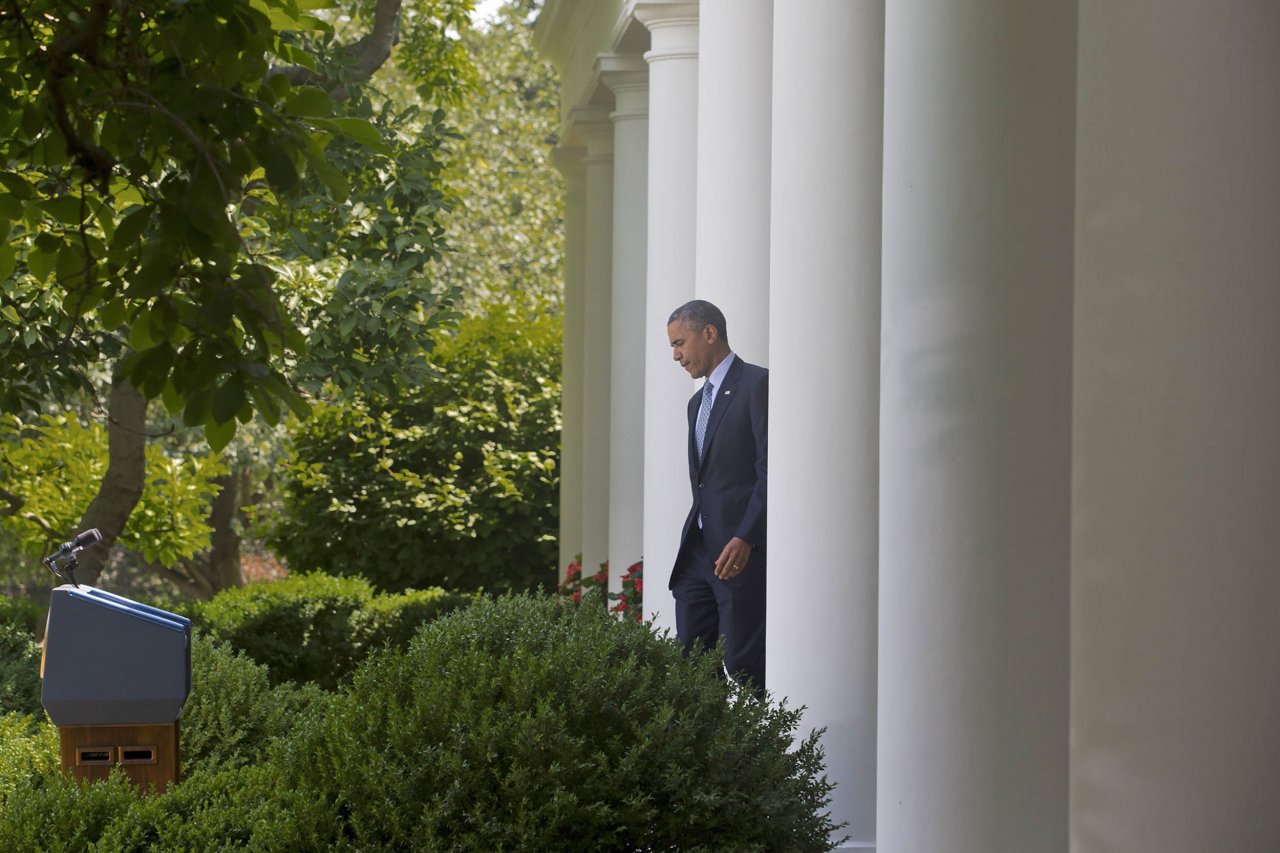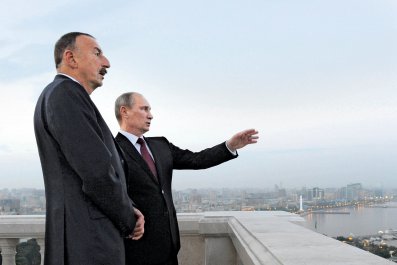Of all the outrageously uninformed accusations hurled by the Republican Party since the election of Barack Obama, the most absurd is the incessant screaming that the president acts like a dictator. But don't get smug, Democrats: Your rebuttal of that charge has been equally uninformed.
What raised this specter yet again was word that Obama decided to issue an executive order allowing 5 million undocumented immigrants—or, as fist-shaking conservatives prefer, illegal aliens—to avoid deportation and allow many of them to receive work visas, so long as they have children born in America or have lived in the country for least 10 years. Before you start banging out comments or letters, please note: This column is not about immigration. It is about the power of a president to issue such a directive.
Somewhere along the line—say, on January 20, 2009, at 12:01 p.m.—Republicans decided the president is only allowed to propose bills, sign legislation or veto it. Conservative politicians and pundits have whipped their supporters into a frenzy, suggesting that executive orders are an unlawful power, created out of Obama's imagination to exert dictatorial control over America.
Since the news that Obama planned to issue the immigration order, smart people who know better—or, if they don't, are dangerously ignorant—have come out with some of the most untruthful, disingenuous statements imaginable. Conservative pundit Charles Krauthammer declared that such an action by the president would be "an impeachable offense." Several Republicans in Congress agreed, including Representative Joe Barton of Texas. While not going that far, House Majority Leader John Boehner declared that Republicans would fight the effort, saying, "Our goal here is to stop the president from violating his oath of office and violating the Constitution." And Sarah Palin.... Sorry, I said I would be quoting smart Republicans.
But the response of many Democrats has been, while truthful, not completely honest. They point out that executive orders are legal and that Obama has used them far less than his modern predecessors: 193 orders, about 100 fewer than George W. Bush, who issued 291, and almost 200 fewer than Ronald Reagan, with 381. Some presidents had more than 1,000 executive orders.
While the concept is not expressly written into the Constitution, president after president has read the grant of executive power in Article II as providing the authority for them, and the judicial branch has repeatedly found this to be constitutional.
Why is this a weak response? Because an action taken through an executive order is not constitutional just because a president says so. Presidents have issued orders that exceeded their authority, and the Supreme Court has rightly slapped them down. In other words, those like Krauthammer who scream about impeachment or the illegality of Obama's orders are declaring that a typical dispute over the balance of power between the president and the Congress—a debate that has been part of American history for centuries—somehow veers into the world of criminal acts.
So let's shelve all this "Dictator!" and "Better than Bush!" tomfoolery and address the underlying issue: What are the limits of executive power and would Obama exceed them by issuing the immigration order?
The answer to the second question is: probably not. Now, that doesn't mean the conservatives on the Supreme Court (which, as I discussed in a recent column, are simply politicians in robes) wouldn't shoot down such an order and establish more of their "since Obama is president, the Constitution has changed" rulings that they will later ignore as precedent when they see fit. And Congress has the absolute power to pass legislation overturning Obama's order, although getting the president's signature on such a proposed law without shutting down the government or overriding a veto would be a challenge.
But impeachment? The suggestion is absurd and demonstrates that at least some in the Republican Party have been emboldened by the ludicrous snipe hunt that was the Clinton impeachment frenzy and now seemingly believe that what the Founders considered to be an exceptional act used only in the most extreme of circumstances is just another arrow in the political opposition's quiver.
There is plenty of history to show that Obama has the authority to issue such an immigration order. Start with this: Lincoln freed the slaves in the Confederate states. The Emancipation Proclamation was an executive order, one in which the president declared that, once the Union Army reached enslaved blacks held in the Confederacy, they would no longer be held against their will.
Today, few but the most die-hard, Confederacy-loving lunatics would describe Lincoln's order as anything other than one of the greatest and bravest actions of a president in this nation's history. But at the time, Southerners widely derided Lincoln as a tyrant stealing their property—and that was before his proclamation.
Executive orders have also been used to do horrible things. Perhaps the most dreadful came from Franklin Roosevelt, who in 1942 issued Executive Order 9066, which led to the internment of Japanese-Americans in camps. That order was challenged, but, in a 6-3 decision, the Supreme Court upheld it as a valid exercise of presidential authority. (That ruling has never been overturned, although the Obama administration in 2011 filed official notice that the decision was in error.)
Some conservatives are taking a different approach: They argue that no president has the right to issue an executive order declaring an entire group of people to be beyond prosecution, rather than exempting specific individuals. While that opinion might sound reasonable, it has absolutely no founding in law, history or the Constitution.
An order that illegal immigrants with children will not be prosecuted for deportation clearly falls under a presidential pardon power under Article II, Section 2 of the Constitution, which the Supreme Court has interpreted as allowing for blanket amnesties for large groups of people. In 1974, President Gerald Ford issued an order offering a general amnesty to thousands of men who evaded the draft during the Vietnam War on the condition that they identify themselves and work up to two years in public service jobs. No credible political figure ever maintained that Ford had acted beyond his Constitutional authority. (A little more than two years later, Carter pardoned all of the draft evaders who requested it. Again, while the order was criticized, no official body ever contended that Carter had violated the Constitution by issuing it.)
Then there are the examples set by President Ronald Reagan. While historically challenged modern-day conservatives often maintain that Reagan would have joined them in dangling tea bags from his hat while dressing up as George Washington, he was actually much more of a pragmatic Republican than the mythmakers want to remember. In 1986, Reagan and the Congress worked together (ah, those were the days) to enact an overhaul of the nation's immigration laws, granting legal status to as many as 3 million foreign nationals who had come to the country before 1982. However, there was one big problem: The spouse and children of an immigrant who met the law's requirements might not be covered by the law. In other words, some people who would be in the country legally following the overhaul would have to stand by and watch their family members deported.
The easiest way to handle the problem was to amend the law, and Reagan went to Congress to try to get it done. (See? Reagan wouldn't have fit with the Tea Party—he had compassion.) But Congress wouldn't budge. Spouses and children who didn't qualify under the 1986 law would have to be deported while their family members who did would be left behind.
So Reagan did what it appears Obama will do: He declared he would not allow the policies of the United States to split up families. He used his authority as president to declare that the minor children of parents who had qualified under amnesty would not be deported.
Look at the similarities here. Reagan declared children of legal parents would not be deported; Obama is prepared to declare that parents of legal children will not be deported. Why is one a lawful act performed by the patron saint of the Republican Party, while the other is an impeachable offense?
And guess what? George H.W. Bush did the same thing. The Senate passed an immigration reform bill that the House refused to take up. (Just what has happened during the Obama administration.) So in 1989 Bush ordered that the Senate bill be adopted as policy, broadening the legal status of families and protecting almost half of the undocumented workers in the country from deportation.
Setting up new criminal justice systems, locking people up, stopping deportations, sealing presidential papers from outside examination and on and on—presidents have done all of it by executive order. So why is it that the people who know better keep lying to their base and pretending something exceptional and illegal is going on with Obama?
The answer stems from the fundamental dishonesty of American politicians who know they can lie with impunity because voters, despite all of the "facts" funneled at them every day, could well be the most uninformed in American history. With our ability to choose cable networks, radio programs and websites that spend the whole day telling their audience "You're right! You're right!," few hear anything about policy, law and our history anymore. They certainly hear nothing that might make them stop and rethink their beliefs.
And that makes it much easier for dishonest politicians. Washington needs to be debating immigration and deciding what changes should be made to an antiquated and rickety system. These are complex yet essential questions, the kinds that, if answered, might alienate one segment of the electorate. Screaming "Dictator!" and "Impeachment!" is so much easier for politicians than actually doing their jobs.

























